GOLD: Short-Term Pullback Possible, New Record Highs Inevitable
David Brady
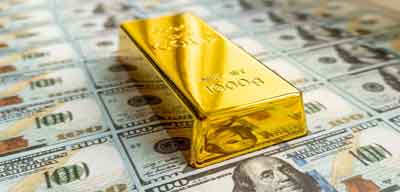 Fears regarding the banking crisis have receded somewhat. Shares in Deutsche Bank are up 13% off their low last Friday. Its credit default swap has fallen in price too. First Citizens Bank has agreed to take over Silicon Valley Bank (SVB). According to Bloomberg, U.S. authorities are considering expanding an emergency lending facility for banks in ways that would give more time to shore up their balance sheets, with First Republic Bank being the initial beneficiary. Fears regarding the banking crisis have receded somewhat. Shares in Deutsche Bank are up 13% off their low last Friday. Its credit default swap has fallen in price too. First Citizens Bank has agreed to take over Silicon Valley Bank (SVB). According to Bloomberg, U.S. authorities are considering expanding an emergency lending facility for banks in ways that would give more time to shore up their balance sheets, with First Republic Bank being the initial beneficiary.
From the moment SVB was rumored to be in trouble on March 9, bond yields started to drop as depositors withdrew their funds from the banks and bought the safety of U.S. Treasury bonds:
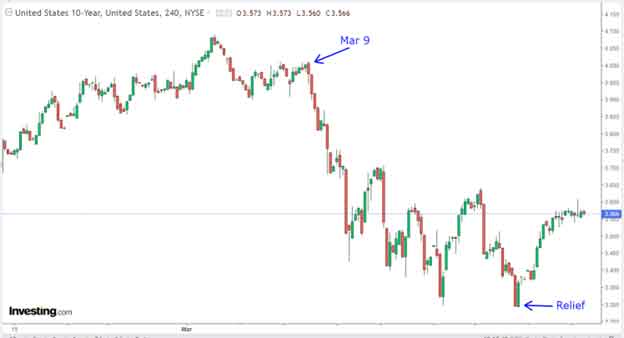
Yields are rising again now that the banking crisis is supposedly over and funds are moving back into risk assets such as stocks:
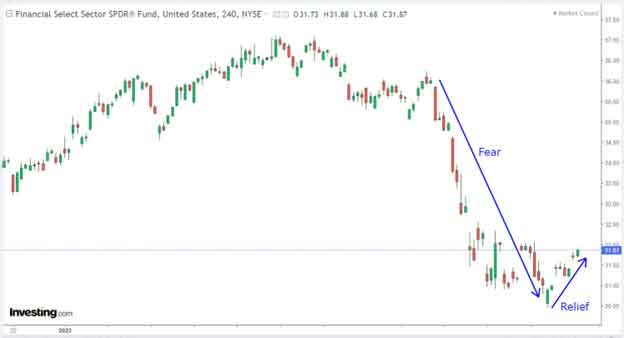
The S&P has gone straight up from ~3900 to 4025 at this time.
What is strange is that the DXY is not benefitting from higher bond yields. They typically have a strong positive correlation. The DXY fell when yields fell as soon as the SVB news broke, but apart from a one-day pop, the DXY is unchanged since the banking “relief” news:
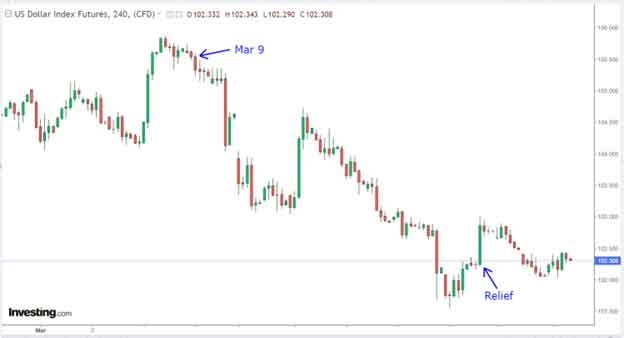
As for Gold…
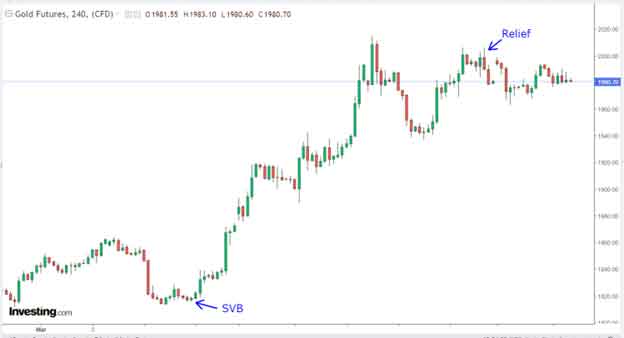
SVB’s collapse triggered the rally off the low 1800s in Gold to over 2000. This was thanks in part to a huge spike in demand for physical precious metals courtesy of the run on bank deposits to safety not just in bonds, but in Gold and Silver too. The “temporary” bailouts by the Fed didn’t hurt, either, nor did the dollar’s renewed decline. Since the fears about the banking sector have receded, Gold remains strong, unlike bonds. Why?
Perhaps it is because investors in Gold have lost confidence in the banks and don’t believe the crisis in the banking sector is over. They’re happy to park their funds in physical precious metals long-term. Yellen certainly did nothing for confidence in the banks with her daily flip-flops on whether the Fed and Treasury will bail out all the banks or only those that are too big to fail. The fact that she won’t categorically state that they will bail out all of the banks’ deposits certainly suggests that they don’t plan to. It also adds credence to the notion that the crisis in the banking sector is not over.
Let’s turn to Bank of England Governor Andrew Bailey for his opinion. After all, this crisis is global. All banks are inter-connected.
On Tuesday, he said that the UK financial system is in a period of “very heightened tension and alertness” for further turmoil in the banking sector. The central bank has to be “very vigilant.”
BUT... "The UK banking system remains in ‘a strong position.’"
Anyone see the contradiction? The banking system is strong… BUT we need to be "very vigilant"? Then it is NOT strong if you need to be so vigilant. These central bankers "tell you want you want to hear" to maintain confidence. Bernanke confirmed this years ago. Does this sound like the banking crisis is over? Far from it.
Perhaps everyone is figuring this out and that is why Gold and Silver are not dropping. In fact, they're getting ready to go much, much higher.
As a quick aside, why would U.S. Treasury only help the biggest banks that get into trouble? If they fail in spite of their size, doesn’t that mean they’re even more culpable? My guess is it’s because they hold the most derivatives and that is the next bomb to go off if the banking sector collapses. That’s another crisis for another day. But it does make a strong argument for a far higher Gold (and Silver) price in the near future.
When the banking crisis does resume—and bailouts are the order of the day and even the biggest banks are in trouble—bond yields likely fall again, initially. But as the Fed’s balance sheet balloons, confidence in U.S. banks, bonds, the dollar, and ultimately U.S. policies will be significantly eroded. The beneficiaries will be precious metals and miners, and probably Bitcoin too.
If that were not enough, consider that the Fed announced the end of its tightening policy at the March FOMC. They have planned for just one more rate hike of 25bp in May. It could be zero if the banks significantly tighten credit, causing demand to fall and inflation too. If and when that happens, what happens to bond yields? They likely drop again. What happens to the DXY? All else being equal, it drops too. Which assets benefit? Basically everything else, including stocks and commodities, but especially Gold, Silver, and Bitcoin.
The fundamentals are the primary drivers in Gold and Silver these days, which makes sense in such a volatile environment. Fortunately, they’re lining up in the same direction: higher prices.
In the short-term, the risk of a pullback to 1900 remains before Gold heads higher again. But that’s just a different route with the same destination: UP!
The usual caveats are a stock market crash or a banking crisis in Europe that weakens the euro and sends the DXY north.
However you slice it, the coming rally to new record highs in precious metals and miners appears inevitable, regardless of whatever hiccups occur along the way.

David Brady has managed money for over 25 years for major international banks and corporate multinationals both in Europe and the US, with experience in Bonds, Equities, Foreign Exchange, and Commodities
www.sprottmoney.com
| 

